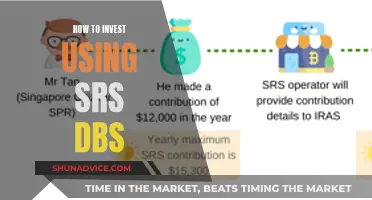
Cash investments are short-term, highly liquid, low-risk investments that provide a return in the form of interest payments. They are usually held for fewer than 90 days and are often used by investors who need a temporary place to keep their money while researching other investment products. Cash investments are also used to reduce the risk of inflation and can include bank products such as savings accounts, money market accounts, and short-term certificates of deposit (CDs) or fixed-income bills. They are considered one of the safest investments due to their liquidity and low risk of loss.
| Characteristics | Values |
|---|---|
| Investment type | Short-term |
| Risk | Low |
| Returns | Low |
| Liquidity | High |
| Maturity period | 3 months or less |
| Examples | Money market accounts, certificates of deposit, savings accounts, etc. |
What You'll Learn

Short-term obligations
Cash investments are short-term obligations, usually for fewer than 90 days, that provide a return in the form of interest payments. They are considered low-risk investments with high liquidity and a short maturity period, typically less than three months. These investments are often undertaken by individuals who need a temporary place to keep their money while exploring other investment opportunities or preserving capital.
Cash investments are known for their stability and low risk compared to other investments. They are easily accessible and provide a high level of liquidity, allowing investors to quickly convert them into cash with minimal loss of value. This feature is particularly advantageous during emergencies or unexpected expenses, as investors can easily access their funds. Examples of cash investments include money market accounts, certificates of deposit (CDs), savings accounts, and Treasury bills.
Money market accounts are similar to savings accounts but typically offer slightly higher returns. They are considered highly liquid investments, allowing investors to access their money quickly. CDs, on the other hand, offer higher interest rates than typical bank accounts but have lower liquidity. Investors can choose from various CD terms, ranging from a few months to several years. However, withdrawing funds from a CD before its maturity date may result in a penalty.
Savings accounts are another option for cash investments, offering interest on the deposited amount. The interest rates on savings accounts are generally very low, and some institutions may charge fees if a minimum balance is not maintained. Treasury bills, issued by the government, are short-term debt securities with maturity dates ranging from a few days to a year. They are considered very safe due to government backing and are sometimes described as risk-free investments.
While cash investments provide stability and low risk, they also have some limitations. One of the main disadvantages is the overall rate of return, which is typically lower than riskier investments. Additionally, some cash investments, such as CDs, have fixed terms, and early withdrawal may result in forfeiting interest payments and penalty fees.
Operating vs Investing: Where Do Customers Fit in Cash Flow?
You may want to see also

Direct financial contributions
Cash investments refer to direct financial contributions by individuals or businesses to a venture, as opposed to borrowed money. They are typically short-term obligations, usually fewer than 90 days, that provide a return in the form of interest payments.
Cash investments are considered a safe investment option for those looking to preserve their capital. They are also undertaken by investors who need a temporary place to keep their cash while researching other investment products.
- Money Market Accounts (MMAs): These are highly liquid investments that pay variable interest rates, usually slightly higher than traditional savings accounts. They are considered low-risk and are easily accessible. Examples include commercial paper and Treasury bills.
- Certificates of Deposit (CDs): CDs function like bonds, making periodic interest payments over a predetermined period. Unlike bonds, funds in a CD are typically locked in with a bank. Withdrawing money before the maturity date may result in a penalty. CDs are insured by the Federal Deposit Insurance Corporation (FDIC) up to a certain limit.
- Savings Accounts: These are considered an alternative to cash investments, offering very low-risk and minimal interest rates. Some institutions may charge fees if a certain average minimum monthly balance is not maintained.
- Treasury Bills (T-Bills): T-bills are short-term government debt securities, usually with maturity dates ranging from a few days to a year. They are considered very safe due to government backing and are sometimes described as risk-free investments. The interest earned on a T-bill is the difference between the discounted purchase price and the full face value paid at maturity.
- Money Market Mutual Funds: Offered by mutual fund companies, these funds make very short-term investments to maintain a stable value. They invest in various types of corporate and government debt, and municipal debt for tax-free funds. Money market mutual funds provide easy access to funds and fast transfers but may have minimum balance requirements to avoid fees.
Cash Repayments: A Smart Investment Strategy?
You may want to see also

Low-risk, high-liquidity options
High-yield savings accounts
High-yield savings accounts are considered very low-risk investments as there is almost no risk of losing money. They are also highly liquid, allowing you to withdraw money whenever you need it. While the interest rates offered by these accounts can vary, you are guaranteed to earn at least a modest return. Additionally, high-yield savings accounts are often government-insured, ensuring that you will be compensated even if the financial institution fails. This makes them an excellent option for storing your emergency fund or money that you need for near-term purchases.
Money market accounts
Money market accounts are similar to savings accounts but typically offer slightly higher interest rates. They also tend to require higher minimum deposits. Like high-yield savings accounts, money market accounts are protected by the FDIC, ensuring the safety of your principal. However, one of the biggest risks associated with money market accounts is the possibility of losing purchasing power over time if inflation outpaces the interest earned.
Short-term certificates of deposit (CDs)
CDs are considered very low-risk, especially when held in FDIC-backed accounts. They offer fixed interest rates over a set period, usually six months to five years, and their returns are typically higher than those of savings accounts. However, withdrawing money from a CD early may result in a penalty. To get the best rates, it is recommended to shop around online and compare what different banks are offering.
Series I savings bonds
Series I savings bonds, also known as I bonds, are a type of low-risk bond that adjusts for inflation. They offer a variable interest rate that is adjusted twice a year to match the rate of inflation. I bonds are backed by the US government, making them a safe investment option. However, if you redeem an I bond before five years, you will be charged a penalty equal to the last three months' interest.
Treasury bills, notes, bonds, and TIPS
Treasury securities, such as T-bills, T-notes, and T-bonds, are considered very low-risk investments. They are backed by the full faith and credit of the US government and have a history of always being paid. Treasury bills mature in one year or less, while Treasury notes have maturities of up to 10 years, and Treasury bonds mature in 20 to 30 years. Treasury Inflation-Protected Securities (TIPS) are another option that adjusts for inflation, with maturities of five, 10, or 30 years. All of these options are highly liquid and can be easily bought and sold.
Invest Cash: Safe, Liquid Strategies for Beginners
You may want to see also

Interest-based returns
Cash investments generally provide returns in the form of interest payments. These interest rates may be fixed, such as with certificates of deposit (CDs), or variable, as seen with money market accounts. While the returns on cash investments are relatively low compared to other investments, they are relatively stable and less susceptible to market fluctuations. This stability makes cash investments attractive to risk-averse investors.
CDs, a common type of cash investment, offer periodic interest payments over a predetermined period, usually ranging from a few months to several years. Investors who commit to longer terms may be rewarded with higher interest rates. However, early withdrawal from CDs often results in penalties, reducing the total return.
Money market accounts, another popular cash investment option, offer slightly higher interest rates than traditional savings accounts. These accounts are highly liquid, allowing investors easy access to their funds. Money market funds, offered by mutual fund companies, are a type of money market account that invests in ultra-short-term, low-risk assets. These funds aim to maintain a stable share price while providing slightly higher returns than traditional savings accounts.
Savings accounts, whether through banks or brokerage firms, also fall under the category of cash investments. While the interest rates on these accounts tend to be minimal, they offer the advantage of liquidity, allowing investors to access their funds without penalties.
In summary, cash investments provide interest-based returns that are generally lower than those of riskier investments but offer the benefits of liquidity, stability, and capital preservation. The specific type of cash investment chosen will determine the interest rate structure, level of liquidity, and potential penalties associated with early withdrawal.
Creating a Cash Flow for Investing: A Beginner's Guide
You may want to see also

Cash equivalents
Examples of cash equivalents include:
- Marketable securities: These are financial assets and instruments that can be easily converted to cash and are very liquid. Examples include T-bills, CDs, bankers' acceptances, commercial paper, stocks, bonds, and exchange-traded funds (ETFs).
- Money market funds: These are mutual funds that invest only in cash and cash equivalents. They are very liquid and have excellent credit quality.
- Short-term government bonds: These are issued by governments to fund projects and are considered cash equivalents due to their liquidity and active trading.
- Treasury bills: Commonly referred to as "T-bills," these are securities issued by the United States Department of the Treasury that mature in one year or less.
- Commercial paper: These are short-term, unsecured debt instruments issued by corporations with maturities of up to 270 days.
- Certificates of Deposit (CDs): CDs are a type of savings account where a certain amount of the saver's capital cannot be accessed for a specific period. CDs may be considered cash equivalents depending on their maturity date.
To be considered a cash equivalent, an investment must meet the following criteria:
- Liquidity: Cash equivalents must trade in liquid markets and be very easy to convert to cash.
- Short-term investment: Cash equivalents must be convertible to cash quickly, typically within 90 days or less.
- Low-risk/volatility: Cash equivalents are meant to be low-risk investments with minimal price fluctuations.
- Unrestricted access: Conversion of cash equivalents to cash should be unrestricted, allowing investors to access their funds on demand.
Angel Investment Cash Flow Statement Strategies
You may want to see also
Frequently asked questions
A cash investment is a short-term financial instrument with a maturity period of fewer than 90 days. It is considered a low-risk investment option that provides high liquidity and stable, low returns. Examples include money market accounts, certificates of deposit (CDs), and savings accounts.
Cash investments are readily accessible and provide a stable, low-risk place to put your money. They offer a modest return, usually in the form of interest payments, and can help protect against inflation.
Cash investments provide a safe and liquid way to store your money while earning a slight return. They are a good option for those seeking capital preservation and low-risk investments. Additionally, they can be used as an emergency fund to cover unexpected expenses.
The main disadvantage of cash investments is the low potential return compared to other types of investments. As inflation and taxes can erode the real value of your investment over time, cash investments may not be suitable for long-term goals.







